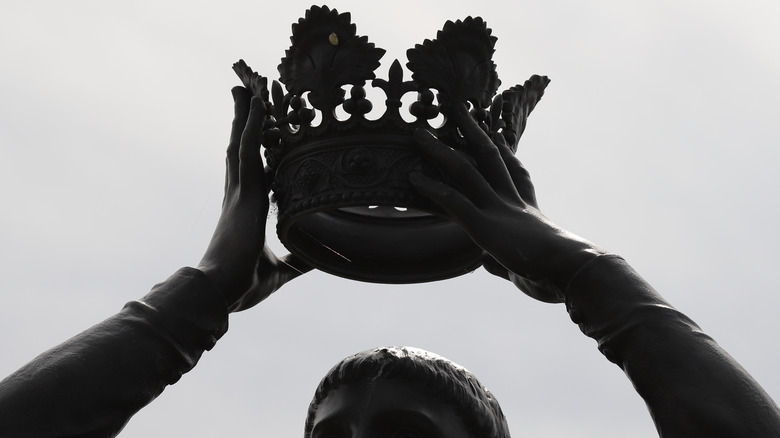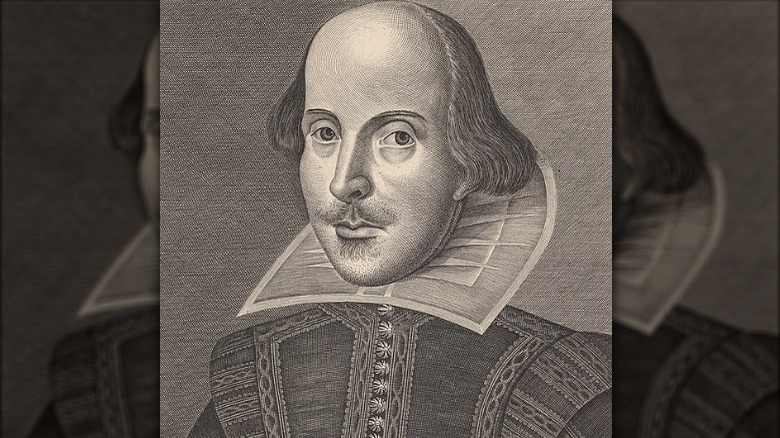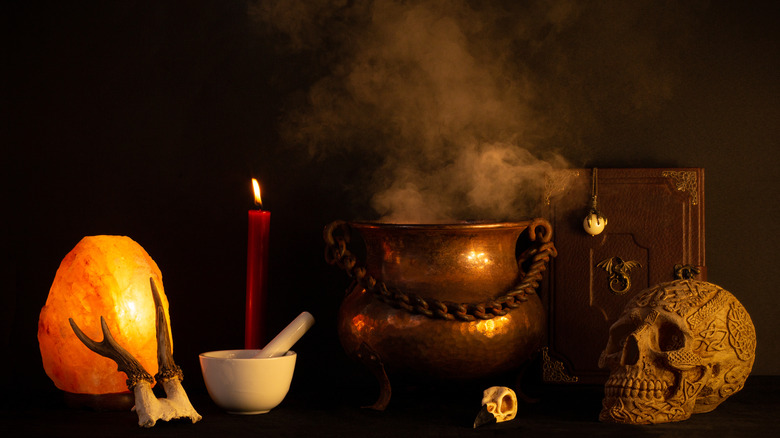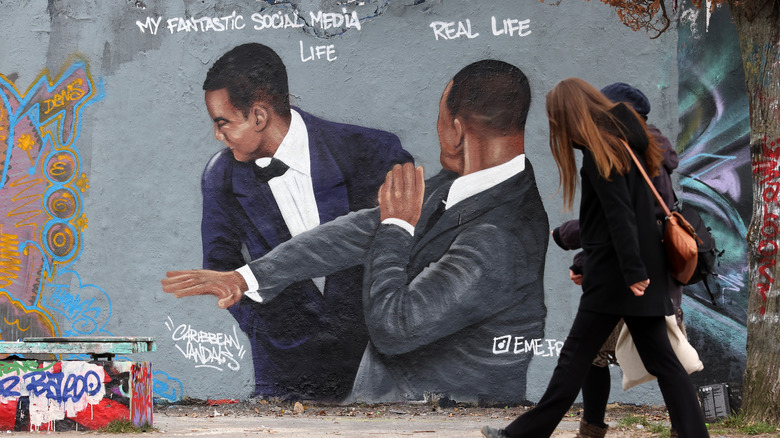Why The Macbeth Curse At The Oscars Is Trending On Social Media
"Fillet of a fenny snake / In the cauldron boil and bake / Eye of newt and toe of frog / Wool of bat and tongue of dog / Adder's fork and blindworm's sting / Lizard's leg and howlet's wing / For a charm of powerful trouble / Like a hell-broth boil and bubble."
Those lines aren't a mere rhythmic flex that would leave most rappers dripping with envy, they're Shakespeare. Specifically, they're spoken by the three weird sisters in Shakespeare's ultra-violent, hacky-slashy tragedy of a world turned topsy-turvy by ambition, disorder, and madness: "Macbeth." And if that description of "Macbeth" at all resembles how you feel about the modern world, then congratulations: You've found your true theatrical love. Just don't say the name of the play in a theater, especially while watching it, or especially during a performance. Why? Well, the curse of the weird sisters will turn its eye (of newt) toward you.
So says a rumor that's persisted, some claim, since "Macbeth" first premiered in 1606. But Denzel Washington, who played Macbeth in A24 studio's stylishly minimalist, vaguely sepia 2021 movie-adapted version of the play, must have avoided the curse during filming (besides, their theater was a soundstage). But you know who didn't avoid the curse? Chris Rock, who complimented Washington on his performance during the recent 2022 Oscars, saying simply, "Denzel! Macbeth! Loved it" (via the Independent). And so, some say Rock unleashed the curse of Macbeth on himself in the form of Will Smith's palm.
The curse of power lives on
As much of a shock as it was for Chris Rock to see Will Smith turn violent over mere words, it stunned the world. We'd all gotten cozily used to "one of the most dynamic and globally recognized entertainment forces of our time," as the website for Smith's 2021 memoir describes him (via Will the Book), being a vanguard of charm and laughter. The slap heard 'round the world at the 2022 Oscars was such a bizarre, uncanny, seemingly out-of-character moment that it simultaneously embodies the "unnatural deeds" of Macbeth himself (quoted from The Folger Shakespeare), and also illustrates how Smith is a not merely an on-screen persona or character, but just another guy. All in all, if any happenings seem curse-created, the Smith slap saga looks high on the list.
In a turn of truly Shakespearean irony and drama, Denzel Washington, fresh off the lessons learned by playing the tyrant-king Macbeth, said to Will Smith after the incident, "At your highest moment, be careful, that's when the devil comes for you" (via NME). Washington was presumably referring to Smith receiving the 2022 Oscar for best actor for his portrayal of Richard Williams, father of tennis legend Serena Williams. And funny enough, the name of that Serena Williams movie, "King Richard," is an eerie echo of Shakespeare's portrayal of the mad English king himself, Richard II, in the play of the same name. After all, history has never wanted for rulers turned unhinged by power.
Death, blood, and fear on set
Rumors of the Macbeth curse — simply uttering the name Macbeth within a theater — goes back quite a bit. Ever since the play first premiered in 1606, productions of "Macbeth" have been littered with accidents, enough to make performers, producers, and directors cautious, if not downright superstitious, as Penguin Books explains. The play features lots of choreographed fights, is charged with emotions that might make people careless, and tends to run longer than other plays because it's always been so popular. All in all, the stage is set (so to speak) for an increased potential for accidents. Plus, everyone on set doubtlessly tosses around the word "Macbeth" constantly. This might be enough for some to conclude, "saying Macbeth = curse."
However, as the Royal Shakespeare Company describes, productions of "Macbeth" really have involved an uncanny number of not only disturbing accidents, but deaths. Legend says that the actor playing Lady Macbeth in the play's very first production died, and Shakespeare himself had to play the part. Other people have died because real daggers were used instead of props. In 1937, the theater manager of London's Old Vic theater, Lilian Baylis, died on the night of dress rehearsal, and a stage weight fell and barely missed legendary actor Sir Laurence Olivier. Then, the director and actress playing Lady Macbeth got into a car accident. In 1942, three actors died while performing the play, and the costume designer committed suicide. On and on it goes.
Satanic panic in Scotland
The tale of Macbeth's curse took root when Shakespeare was originally writing the play. The late 16th century was a time of extreme fear of witchcraft in Scotland, where "Macbeth" takes place. Starting with the passing of The Scottish Witchcraft Act in 1563, Scotland embarked on a 100-year massacre of people believed to be witches. Almost 84% of victims were women (via The Guardian). The year 1590 marked the first of five intense Satanic panics, itself resulting in "The Great Witch Hunt of 1597" when 400 individuals were rounded up and executed (via Scottish Legal). Only as recently as March 2022 has the Scottish government formally apologized for it all (per The Conversation).
This was the environment within which "Macbeth," a play featuring witches performing witchcraft on stage, was written. As the Royal Shakespeare Company explains, King James VI of Scotland himself was obsessed with the occult, possibly inspired by the execution of his mother, Mary, Queen of Scots, at the order of her cousin Queen Elizabeth I of England in 1587. When he became king of England in 1603, he was eager to prove his non-witchcraft-endorsing position to the public.
One year later, playwright and Shakespeare contemporary Christopher Marlowe released "Doctor Faustus," a tale about a literal "deal with the devil" that featured sorcery and demonology. Shakespeare, always keen on the current of public opinion, as well as making good with the aristocracy, jumped on the trend and wrote "Macbeth." As described, it was released in 1606.
Newts, rhymes, and political intrigue
As the Royal Shakespeare Company describes, some folks have suggested that Shakespeare located an honest-to-goodness black magic coven in the interest of adding verisimilitude to "Macbeth." As this story-within-a-story goes, Shakespeare chatted them up, and the coven related to him secrets of their craft (for some reason), including the ingredients in the weird sister's brew: fenny snake, eye of newt and toe of frog, and the rest.
The witches also imparted to Shakespeare, as Penguin Books continues, the creepy rhyme scheme for the weird sister's famous "double, double toil and trouble" incantation. Such folks cite the incantation's use of a tetrametric rhyme pattern (four stresses per line), rather than the bard's typical pentrametric rhymes (five stresses per line). The cursed conclusion? All the bad stuff that's happened during productions of "Macbeth" happened because the witches didn't want Shakespeare to talk about what he'd learned.
Regardless, when "Macbeth" premiered, audiences were primed for a bit of on-stage witchery. The portrayal of the three weird sisters on stage, hunkered over a bubbling cauldron tossing in arcane ingredients, would have been legitimately terrifying. As a bonus bit, Shakespeare even referenced England's new king, James I, directly in the play. The lines, "Though his bark cannot be lost / yet it shall be tempest-tossed," likely refer to when James I once survived a storm at sea. However, because the witches are discussing the tyrannical Macbeth in that passage, Shakespeare might have actually been using "Macbeth" to criticize James I's reign.
Just kidding, some dude made it up
The whole "Macbeth's curse" thing didn't actually take off as an urban myth until the 19th century. And, it actually started as the joke of a single critic.
As Penguin Books explains, "Macbeth" was especially popular in the 19th century (although it's always been popular). Max Beerbohm, critic and cartoonist, was simply "fed up with" the whole "Macbeth" thing, and decided to satire it. Remember the old "Lady Macbeth's actor died in the original production" story? Beerbohm made it up. More to the point, he did so to illustrate how folks hunt and peck for whatever historical information they want, especially from Elizabethan England (Shakespeare's time). Acclaimed playwright George Bernard Shaw dubbed the tendency "Bardology."
So if folks on Twitter start linking Scotland's 16th-century Satanic panic to Will Smith flipping out and assaulting Chris Rock over a milquetoast Oscar joke? You can see that it takes a true feat of magical might — and rational acrobatics — to make such an impossible leap, even more than the magic on display in "Macbeth's" "double, double toil and trouble" scene. The real curse of "Macbeth" isn't the curse of any flesh-and-blood magic users, but the curse depicted in the story's guts. Namely, that we ought to be wary of those who seek power, because once they've got it, things often go awry. At least this is a curse that Will Smith might just be familiar with.





